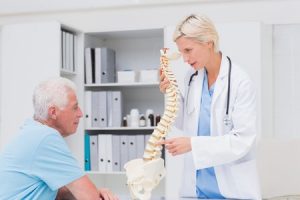Each week, Dr. Mauk shares thoughts relevant to Baby Boomers that are aimed to educate and amuse.
Aging in Place: Home Preparations and Modifications for Alzheimer’s Patients
According to the Alzheimer’s Association, the disease affects five million Americans. However, this number doesn’t reflect the many more Americans that are affected by Alzheimer’s indirectly. This includes family and friends that take on the great responsibility of caring for a loved one with the disease. Many of these caregivers have numerous considerations to keep in mind, and one of these is altering and modifying the home to provide better comfort and safety.
Let’s look at some home preparations and modifications you can make if you need to accommodate a loved one with Alzheimer’s.
Safety and Comfort.
The first consideration should be thinking about is how you can reduce the risk of your loved one tripping, falling, or becoming confused or disoriented.
● Remove objects that can be obstructive in high-traffic areas. Avoid having stuff on the floor or low tables and furniture that can be easy to miss.
● Lock cabinets that might contain hazardous chemicals and materials.
● Keep dark corners of the house well-lit and illuminated. This includes stairwells and basements.
● Check your smoke alarms and carbon monoxide detectors.
● Ensure your loved ones don’t have easy exits where they can wander out.
Functionality and Design
Making your house function better for Alzheimer’s patients means helping them avoid unnecessary disorientation, fear, or depression. The following are some tips:
● Remove clutter or scattered objects that might overstimulate. For example, instead of having five pairs of shoes for your loved one to choose from, leave only one pair. This might eliminate an unnecessary episode of confusion when getting dressed.
● Rearrange furniture in a simple and straightforward way. The way the furniture is arranged can dictate the atmosphere of the room. For example, if the only chair is facing the television, you might have them constantly sitting in front of the TV.
● The Huffington Post suggests that creating a personalized space with familiar objects and smells can be a great way to keep an Alzheimer’s patient comfortable. At the same time, you should avoid having busy patterns on furniture or curtains, confusing colors, or rugs that can cause tripping.
Stimulation and Socialization
It’s important for your loved one to get plenty of socialization and interaction with others. In a typical household, people are working or living their own lives as they juggle the responsibility of caregiving. Living at home without much visitation can often lead to patients becoming isolated and withdrawn. Try to arrange frequent visits by friends and family members. Consider taking loved ones with you if you have to run errands, going for short walks, or involving them in everyday activities.
How to Modify or Renovate Your Home
In order to maintain safety or functionality, it’s often important to do modifications to your home. One of the most common home alterations is improving or renovating bathrooms and kitchens. This is because these are two areas of the house that can be most hazardous and require a little more navigation.
For Bathrooms
Renovations for bathrooms cost an average of about $8,820 depending on the work to be done. Some common and important improvements for Alzheimer’s-friendly bathrooms include installing grab bars and handrails, swapping out a bathtub for a shower, and adding lighting and non-slip flooring.
For Kitchens
You might consider a kitchen modification as well. It will vary in complexity depending on your current setup. When restructuring your kitchen for a loved one with Alzheimer’s, consider faucets, accessibility of appliances, kitchen counter height, mobility, and difficulty of navigation.
Caring for loved ones with Alzheimer’s is a great responsibility. Ensuring their safety and comfort at home will not only make their lives better, but it will make yours easier and remove unnecessary hazards and stress. Having confidence that your loved one is comfortable and at ease will take a big weight off your shoulders. Your loved one will be happy to be living at home. The Boston Globe reported that Alzheimer’s patients that remain at home live longer and better lives.
Photo Credit: Pixabay







